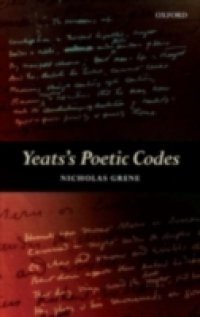Nicholas Grene explores Yeats's poetic codes of practice, the key words and habits of speech that shape the reading experience of his poetry. Where previous studies have sought to decode his work, expounding its symbolic meanings by references to Yeats's occult beliefs, philosophical ideas or political ideology, the focus here is on his poetic technique, its typical forms and their implications for the understanding of the poems. Grene is concerned with thedistinctive stylistic signatures of the Collected Poems: the use of dates and place names within individual poems; the handling of demonstratives and of grammatical tense and mood; certain nodal Yeatsian words ('dream', 'bitter', 'sweet') and images (birds and beasts); dialogue and monologue as the voices ofhis dramatic lyrics. The aim throughout is to illustrate the shifting and unstable movement between lived reality and transcendental thought in Yeats, the embodied quality of his poetry between a phenomenal world of sight and an imagined world of vision.

